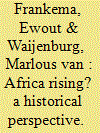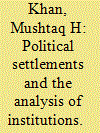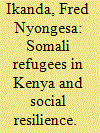| Srl | Item |
| 1 |
ID:
163394


|
|
|
|
|
| Summary/Abstract |
Sub-Saharan Africa’s recent economic boom has raised hopes and expectations to lift the regions’ ‘bottom millions’ out of poverty by 2030. How realistic is that goal? We approach this question by comparing the experiences of three front-runners of region-specific development trajectories – Britain’s capital-intensive, Japan’s labour-intensive, and Ghana’s land-extensive growth path, highlighting some historical analogies that are relevant for Africa, but often overlooked in the current ‘Africa rising’ debate. We draw particular attention to Africa’s demographic boom and the possibilities for a quick transition to labour-intensive export-led industrialization. Although our exercise in diachronic comparative history offers little hope for poverty eradication by 2030, we do see broadened opportunities for sustained African economic growth in the longer term.
|
|
|
|
|
|
|
|
|
|
|
|
|
|
|
|
| 2 |
ID:
163397


|
|
|
|
|
| Summary/Abstract |
Soon after South Sudan achieved independence in 2011, its political landscape grew increasingly volatile. It became almost impossible for international and regional actors to address one crisis before another more serious one erupted. This article combines cultural, political, economic and social factors into a comprehensive framework to explain the role of the political elites in transforming fear and politicized anger into violent and deadly conflicts. The theoretical framework of the security dilemma model is applied to the South Sudanese conflict to demonstrate how it was triggered—and continued to be exacerbated—by the politics of fear.
|
|
|
|
|
|
|
|
|
|
|
|
|
|
|
|
| 3 |
ID:
163398


|
|
|
|
|
| Summary/Abstract |
The political settlements framework argues that the distribution of organizational power is important for understanding the economic and political effects of institutions and policies. Institutions and policies describe rules that in turn determine resource allocation, and these can affect different types of organizations in very different ways. Organizations can be expected to support, resist or distort particular institutions or policies depending on their interests and capabilities. The distribution of organizational power can therefore determine the institutions and policies that are likely to persist as well as the ones most likely to be developmental in that context. This directs our attention to the importance of accurately identifying the relative power and capabilities of relevant organizations that describe a particular political settlement and how these may be changing over time. The articles in African Affairs that have used the political settlements framework demonstrate its usefulness. In this overview we examine the motivations behind the development of the framework and some of the challenges of applying it in the context of dynamic interactions between institutions and organizations. We also discuss the most appropriate definition of a political settlement, the questions the framework is most suited to answer and the challenges ahead for developing the framework and its applications.
|
|
|
|
|
|
|
|
|
|
|
|
|
|
|
|
| 4 |
ID:
163400


|
|
|
| 5 |
ID:
163395


|
|
|
|
|
| Summary/Abstract |
Refugee camps are often perceived as unproductive places that waste people’s potential. What is left unremarked in many refugee accounts, however, is the positive side of camps. Highlighting suffering alone raises academic curiosity as to what keeps camps in protracted situations going for so long. Drawing on the notion of social resilience, this article highlights the multidimensionality of camps as social worlds by showing how the attachment through kin-based networks between Somalis at Dagahaley refugee camp in Kenya and their relatives in diaspora animated collective imaginaries about better futures in Minnesota. The article contributes to migration and humanitarian debates by arguing that refugee longings for onward migration is linked to places with a potential for kin-based support as opposed to random Western destinations, as is often highlighted in the media.
|
|
|
|
|
|
|
|
|
|
|
|
|
|
|
|
| 6 |
ID:
163396


|
|
|
|
|
| Summary/Abstract |
Inequality is a major determinant of access to food in Sudan, with power, wealth and services concentrated within a central Sudan elite, leaving much of the country marginalized, impoverished and suffering repeated emergencies. This article discusses how food aid both contributed to the state’s exclusionary development process and tried but failed to assist crisis-affected populations in its peripheries. In the 1950s, food aid explicitly aimed to support the state but from the late 1980s, emergency food aid bypassed the state and its manipulation led to economic and political benefits for the Sudan government and its closely-aligned private sector. By the 2000s, the Sudan government controlled international food aid and established its own food aid apparatus, which it could use to further its political and military goals. New resilience-based food technologies developed in the aftermath of the 2008 food crisis, and applied in Darfur, have unintentionally facilitated the government’s strategies. This article argues that the ‘actually existing development’ resulting indirectly from food aid has benefited the government and private sector but has left most people facing a protracted emergency.
|
|
|
|
|
|
|
|
|
|
|
|
|
|
|
|
| 7 |
ID:
163399


|
|
|